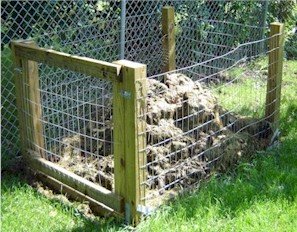Organic Gardening Compost Benefits
The compost benefits are many. It’s truly amazing what compost can do for your organic garden soil. Compost has a truly exceptional capacity to improve the properties of your garden’s biological make-up (living soil organisms), soil nutrition and soil structure.
Benefits of Compost
Your organic garden soil has living soil microorganisms that
include bacteria, algae, fungi, and protozoa. Without getting too
technical lets just say that a healthy soil has lots of biological life
and these organisms need organic matter (compost) to survive and
thrive. This living-soil-life helps with soil
health, decomposition of organic matter, replenishment of
nutrients, humus formation, promotion root growth, nutrient uptake, and
herbicide and pesticide breakdown.
that
include bacteria, algae, fungi, and protozoa. Without getting too
technical lets just say that a healthy soil has lots of biological life
and these organisms need organic matter (compost) to survive and
thrive. This living-soil-life helps with soil
health, decomposition of organic matter, replenishment of
nutrients, humus formation, promotion root growth, nutrient uptake, and
herbicide and pesticide breakdown.
As your organic matter increases, your native earthworm population will also increase in your garden soil. With the presence of earthworms, you have the actions of soil their tunneling that increases nutrient levels, water penetration, and aeration.
Compost Helps Control Plant Diseases
Organic gardening compost adds organic matter into your garden soil that increases the population of soil microorganisms, which in turn help control plant diseases. There is research that actually shows that certain soil microorganisms “suppress” certain plant diseases.
Compost Benefits Soil Nutrition
Compost helps modify and stabilize pH in your organic garden soil. Compost will raise or lower the pH of your soil depending on your existing garden soil, and what organic matter you add to the compost. Compost made up of neutral to alkaline materials will increase the soils pH. And the reverse is true as well. Acidic compost will decrease a soil pH. Compost also helps protect the soil from pH level fluctuations.
Just because soil has nutrients doesn’t necessarily mean your plant roots can utilize them. In poor soils (and dry soils), there is poor nutrient exchange between the roots and the soil. Compost will improve the soil’s nutrient exchange capacity allowing your plants to utilize the nutrients more effectively. If your soils have little organic material, you can bet that nutrient or fertility level is low. YOU NEED COMPOST!
Organic Gardening Compost Provides a "Ton" of Nutrients
Ok maybe not a ton, but compost provides many nutrients in the form of micro and macronutrients. Compost provides a good amount of macronutrients NPK (nitrogen, phosphorous, and potassium), but it’s the micronutrients that are the real heroes of your compost. The organic matter in the soil helps release these nutrients in a stable and slow way that is more beneficial to your plants.
Compost and Commercial Organic Fertilizer
Does Compost do away with commercial fertilizers? The answer is maybe, no and not necessarily. I know that’s not a straight answer, but there really isn’t one. Depending on what nutrients your soil is lacking (or in abundance) certain organic fertilizer will be necessary. In addition to providing nutrients (micro and macro), compost helps make fertilizer more effective in the soil.
Compost Benefits Soil Structure
Composts will enhance your garden soil’s structure. If the soil is sandy and has rapid drainage, compost can help the structure by adding more bulk with humus and organic matter and increase the soil’s water holding retention abilities. Soils with fine soil structure (clay, clay-loam) will benefit, because compost will increase soil porosity (sponginess) by adding humus and organic matter. Compost will also make these fine-textured soils easier to work with and erosion resistant.
Compost in both the short term and long term provides enormous benefits to your soil structure. In the short term, compost helps prevent compaction (an enemy to plant roots and soil organisms!) in fine structured soils. It increases the soil’s water holding retention abilities, and improves soil structure in sandy soils.
This brings us to the long-term compost benefits. In addition to more of the above short term benefits the use of compost increases the soil humus content. Humus acts like glue that holds all the soil particles together, and it helps prevent erosion and increases a soil’s moisture holding ability. Humus will also make the nutrients more available to the garden plant’s roots.
Improved Soil Structure Saves on Water Usage
Compost will provide more water holding retention capacity that will in turn increase drought tolerance and better water usage in the soil. With better water holding capacity, you will have to irrigate less often.
Home › Compost
› Benefits of Compost
Home
› Organic
Vegetable Garden Beds
› Benefits of Compost
Return to the Top of Compost Benefits



Comments
Have your say about what you just read! Leave me a comment in the box below.